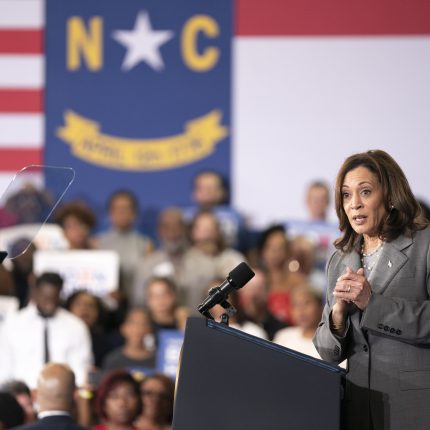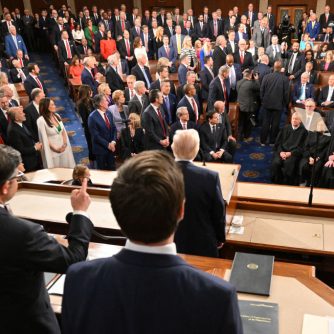In a recent episode of “Carolina Newsmakers,” host Don Curtis welcomed Tom Jensen, director of Public Policy Polling, to discuss the upcoming fall elections and the current political climate. Jensen provided a comprehensive analysis of the polls and key issues that could influence the 2024 elections.
Episode timeline
Introduction to the Political Landscape
Tom Jensen started the conversation by noting that recent polls in battleground states show Donald Trump leading Joe Biden and Kamala Harris by three points. Despite the Republican convention’s fanfare and the excitement around the Democrats changing candidates, the overall race dynamics seem relatively unchanged. This points to a highly competitive race ahead, with both parties having their moments of advantage.
Impact of Vice Presidential Picks
The discussion then shifted to the potential impact of vice presidential picks on the election outcome. Historically, vice presidential candidates have had minimal influence on the overall election results. However, this time, there could be some exceptions. Jensen highlighted that while JD Vance’s selection as Trump’s running mate may not significantly alter the race, Democrats have potential running mates who could make a difference in their home states. For instance, candidates like Mark Kelly in Arizona or Gretchen Whitmer in Michigan could sway crucial battleground states by narrow margins.
Early Start to the Campaign Season
Jensen pointed out that the current election cycle seems to have started much earlier than usual, with significant events and changes already happening. This shift means that both parties need to adapt their strategies to maintain momentum and voter engagement throughout the extended campaign period.
Ceasefire in the Middle East and Its Impact
An interesting turn in the discussion was the potential impact of a ceasefire in the Middle East on the election. Jensen mentioned that international events, such as the situation with Israel and Hamas, have already influenced young voters’ perceptions of Biden’s administration. A ceasefire could potentially help Kamala Harris regain support from these disaffected voters, shifting the race in the Democrats’ favor.
Battleground States and Electoral Strategy
Jensen identified Michigan, Wisconsin, and Pennsylvania as the key states that will determine the election’s outcome. If Harris can secure these states along with Nebraska’s second congressional district, she could narrowly win the presidency. However, states like North Carolina, Georgia, Arizona, and Nevada also remain critical, albeit leaning slightly more Republican at the moment.
Advice for Kamala Harris
When asked what advice he would give to Kamala Harris, Jensen emphasized the importance of engaging the Democratic base while appealing to middle-ground voters. He noted that Harris needs to win over the so-called “double haters” – voters who dislike both Trump and Biden – by presenting herself as a stable and preferable alternative. This involves reaching out to younger voters, African Americans, and Latinos, groups where Democrats have seen some erosion of support.
Advice for Donald Trump
Conversely, Jensen suggested that Trump should focus on appearing more presidential and less erratic to appeal to undecided voters. While Trump’s base is solid, his unconventional style may alienate moderate voters. Staying on script and avoiding controversial remarks could help him gain the trust of those on the fence.
Third-Party Candidates and Their Impact
The discussion also touched on the role of third-party candidates like Robert Kennedy Jr. Jensen argued that while Kennedy’s candidacy might initially seem like it would hurt Biden more, his impact appears to be a wash, drawing equally from both major parties. Historically, third-party candidates tend to lose support as the election nears, consolidating the vote back to the main contenders.
Potential Shifts in the Race
Jensen highlighted the potential for the race to tighten as new dynamics emerge, such as Biden’s decision to step down and Harris becoming the candidate. He suggested that while Trump is slightly favored, there is ample opportunity for Harris to gain ground, particularly if she can capitalize on voters’ desire for a younger Democratic candidate.
North Carolina Politics
Turning to North Carolina, Jensen analyzed the governor’s race, noting that while Trump leads in the presidential polls, Democratic candidate Josh Stein is ahead in the gubernatorial race against Republican Mark Robinson. The lieutenant governor and other down-ballot races remain competitive, with a generic Republican advantage of about two points.
Importance of Voter Turnout
Both parties face the critical task of maximizing voter turnout. Jensen noted that the Democratic turnout lagged behind Republican turnout in 2020, a gap that Harris must close to win in North Carolina and other swing states. Early voting and grassroots mobilization will be essential for both sides.
Impact of Economic Factors
Economic issues, particularly inflation and gas prices, could significantly influence voter sentiment. Jensen pointed out that while the Biden administration has made progress on these fronts, voters’ perceptions may lag behind reality. If voters feel economically insecure, it could sway them towards Trump, regardless of actual improvements.
Conclusion
In conclusion, the upcoming election is poised to be one of the closest in recent history. With battleground states playing a pivotal role and various factors influencing voter behavior, both parties have their work cut out for them. Jensen’s insights underscore the complexity and fluidity of the current political landscape, setting the stage for a highly contested and dynamic election season.





